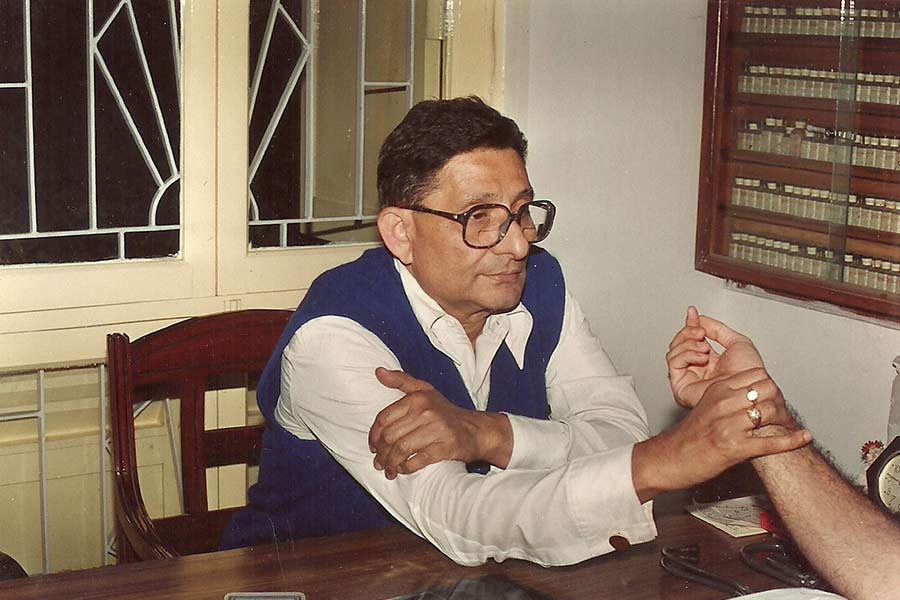A few metres away from the swanky Forum Mall, there is another Elgin Road landmark, which serves a completely different clientele. While one is the go-to shopping destination for the city’s elite, the other is a medical centre for people of all income groups.
The Dr. Prasanta Banerji Homoeopathic Research Foundation (PBHRC) has been treating thousands of people every day, in keeping with the teachings of Ishwar Chandra Vidyasagar from 150 years ago. My Kolkata takes you through their legacy.
‘The goal was to serve the less privileged’
The story starts in the 1850s, in Birsingha, a small village in modern-day West Midnapore. Vidyasagar is said to have been suffering from a bout of migraine, but conventional medicine couldn’t provide him respite. His friend Rajendralal Dutta finally came to his rescue, bringing relief through homoeopathic medicines.
The incident made such a deep impact on Vidyasagar that he spent the next few years learning about the potential of homoeopathy, especially in a country where most people couldn’t afford conventional treatment.
“Ishwar Chandra Vidyasagar was my great-great grand uncle. He was extremely close to his younger brother and my great-great grandfather, Ishanchandra. With the desire to improve healthcare and make it accessible irrespective of financial class, he introduced homoeopathy to him,” says Isha Banerji, director of PBHRC. Ishanchandra continued to offer affordable treatment to the people of Birsingha for almost 40 years, until his passing in 1903. “The goal was to serve the less privileged, often for free. Not only was homoeopathic medicine inexpensive, but it also didn’t have side effects,” she adds.
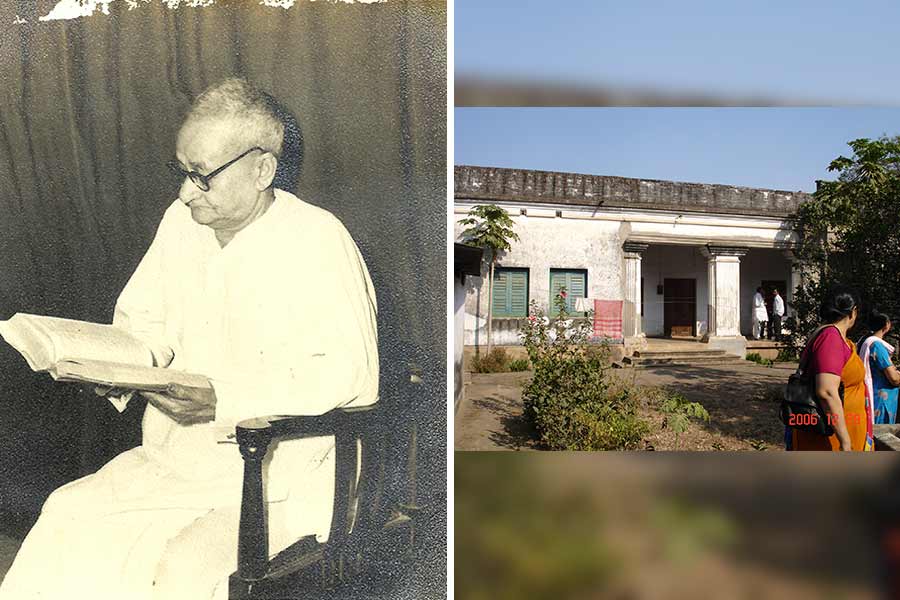
Ishanchandra’s son, Pareshnath, expanded the practice to Mihijam PBHRC
Ishanchandra passed down this passion for service-oriented homoeopathy to his son, Pareshnath, who took the practice to Mihijam. It was here that he invented Lexin, a drug that would go on to treat snake bites not just in India, but around the world. His reputation forced the Indian Railways to arrange a stoppage at Mihijam station, and his patients included Netaji Subhas Chandra Bose, Bidhan Chandra Roy and Rajendra Prasad.
Expansion in Kolkata
Pareshnath knew that the family’s work could change even more lives if it found a voice outside Mihijam and encouraged his son, Prasanta, to take their work to newer pastures. In 1960, he arrived in Kolkata and laid the foundation for what would become PBHRC. “He took up a small two-bedroom apartment on Ashutosh Mukherjee Road, where one room was his house and the other, his clinic. Soon, he was seeing 200 patients a day, and even that apartment started feeling small. The growth was surprising, because he had no contacts in Kolkata and didn’t do any advertising. All he did was practice,” Isha chuckles, adding that even today, 60 years later, PBHRC relies only on word of mouth.
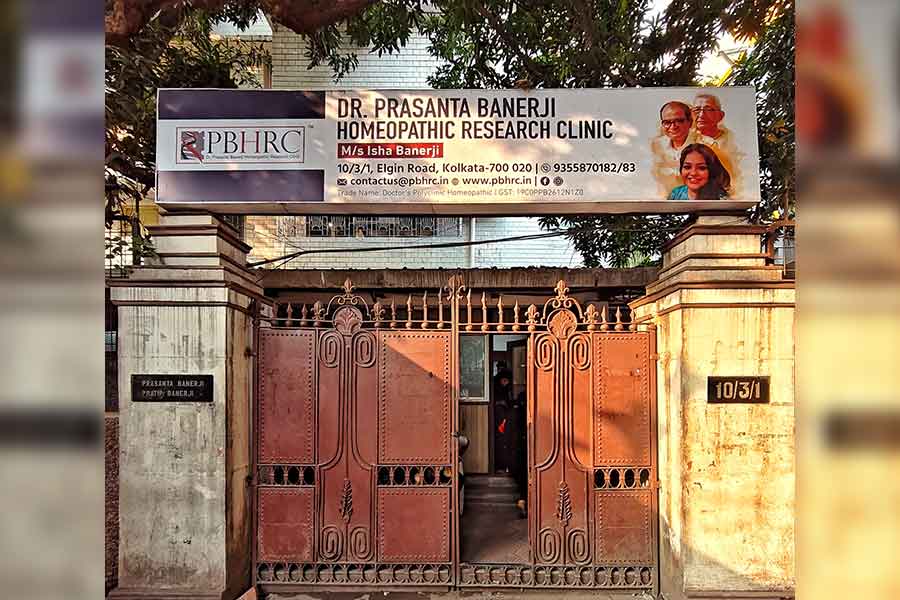
The gates of the clinic on Elgin Road PBHRC
Within a couple of years, the number was touching 500. Prasanta realised that the only way to meet this demand, would be to train and involve more doctors. It was during this time that he started consolidating his family’s homoeopathic learnings over the past century into the Banerji Protocols of Treatment. “At PBHRC, we don’t practise the classic form of homoeopathy, where you are asked 10 questions and then given one medicine for your problem. Our treatments are disease-oriented. If someone comes to us with lung cancer, all our 20 doctors will prescribe the same medicine. My grandfather formalised these protocols to ensure that the treatment process was more efficient and standard, while maintaining high efficacy for each disease,” Isha explains.
The Banerji Protocols have since proved to be revolutionary in homoeopathy treatment, bringing healthcare experts from around the world to PBHRC for training. “Many students have come from abroad and learnt these protocols. This is the main reason why our family didn’t seek a patent for the protocol, despite having the chance to make a lot of money from it. My grandfather always wanted his work to help as many people as possible,” Isha says.
When the daily patient count started crossing 1,000, Prasanta knew that he had to expand. He purchased one of the oldest houses on Elgin Road, in 1980, and transformed it. “Initially, we just had one floor. My grandfather decided to construct a new floor above, which would offer completely free treatment. He felt that it was unethical to charge a fee from patients who wanted to follow up after an initial consultation,” Isha says. To this day, the first floor of PBHRC provides free consultations to patients, along with medicines at nominal rates.
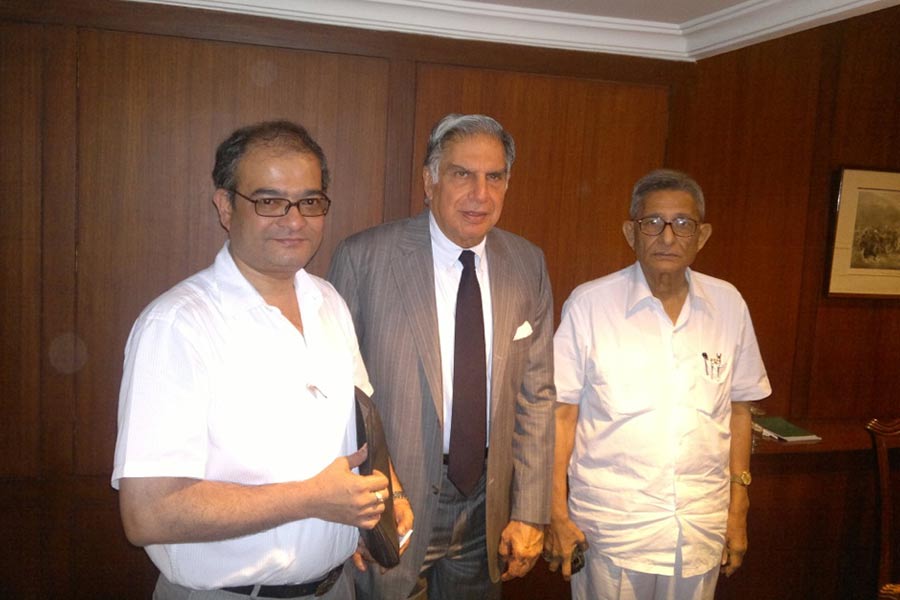
Pratip and Prasanta Banerji with Ratan Tata PBHRC
By 1991, Isha’s father, Pratip, had joined her grandfather after completing his education. He brought in a new era of data collection and documentation to PBHRC, in line with the highest international standards. He also wrote case studies and scientific articles for peer-reviewed journals, making this data accessible to the scientific community. This work also made Pratip and Prasanta eminent speakers at medical conferences around the world.
Mentoring the present
Growing up, Isha remembers being inspired by her grandfather, spending most of her childhood with him. His teachings laid the foundation for the motivations that would guide her back to the clinic decades later. “I would follow him around everywhere, including medical conferences. Even when I went to boarding school, my summer vacations were reserved for him. From the time I was eight, I would write prescriptions on his instructions!” she chuckles.
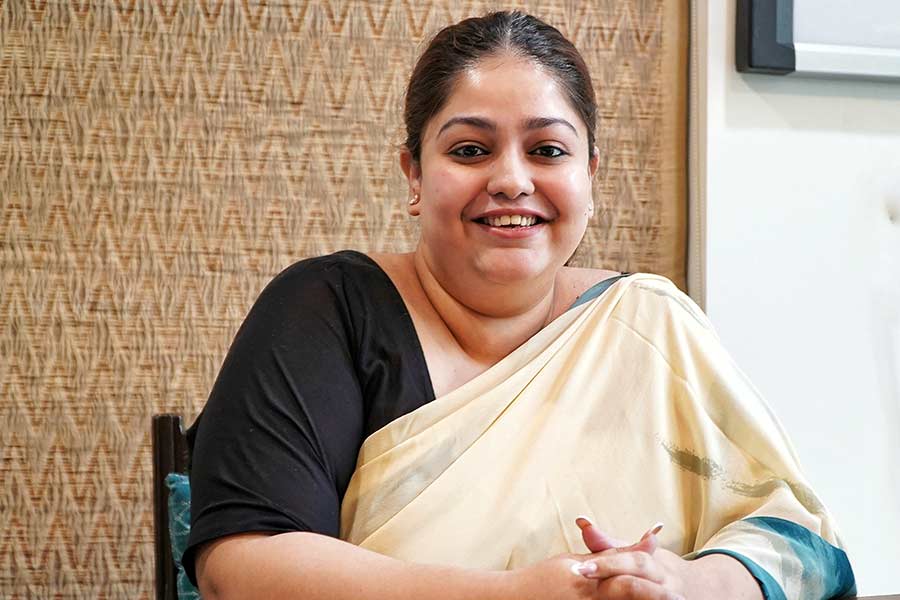
After her father and grandfather’s passing, Isha Banerji has been heading the clinic since 2021 Soumyajit Dey
Prasanta took her under his wing, instilling within her the desire to provide service, rather than run a business. “While his patients came from all income groups, his focus was always on the poor. He also established how nothing matters except the patient before you,” Isha says. She internalised this over the course of all the health camps she accompanied her grandfather to, around rural Bengal. “His philosophy was to practise with empathy and focus and see people as more than just cases. He also chose a path of providing hope, instead of fear-mongering.”
Isha’s diligence made Prasanta mark her as his protege, declaring early on that she would be the one to carry forward the family’s legacy. “Seeing him waking up every morning and doing the same thing every day, with complete commitment made me realise that this was my calling,” Isha reminisces.
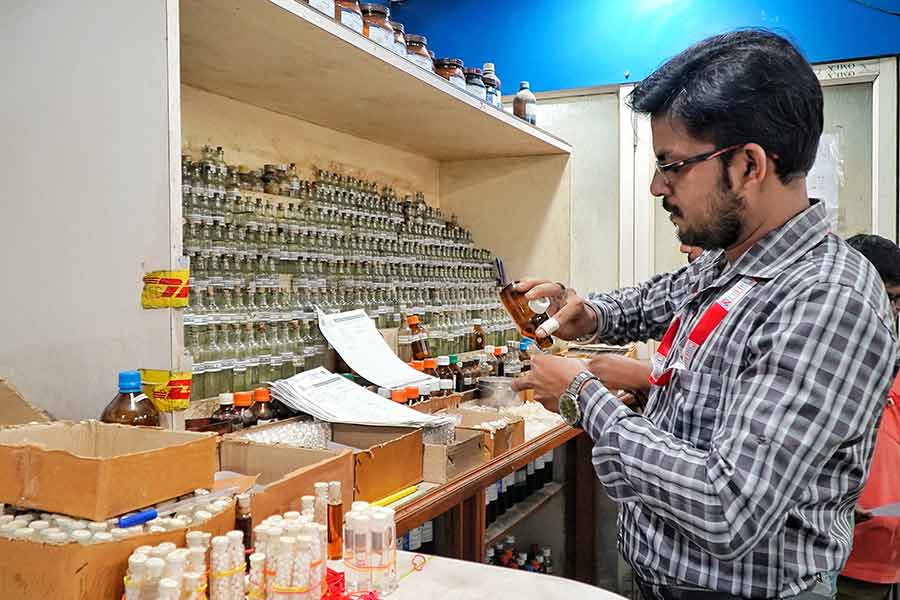
All the medicines are made in-house at PBHRC, with costs as low as Rs 60 for an entire month Soumyajit Dey
His passing in 2018 hit not just the Banerji family, but the entire clinic extremely hard. “He was the daktar babu of Elgin Road and even today I have people coming up to me and saying, ‘Aapni onar naatni, uni bhogoban.’”
The Banerjis dealt with another blow, when Pratip suddenly passed away in 2021. Isha remembers the world crashing down upon her, whilst she was just a second-year student at Salt Lake’s National Institute of Homeopathy. “The staff had seen me grow up, and they insisted that I take charge. I had 75 families depending on me, and if I didn’t take responsibility, an entire institution would collapse. I’m glad I put aside my grief and started working here as an administrator, because this clinic is now my family,” she beams.
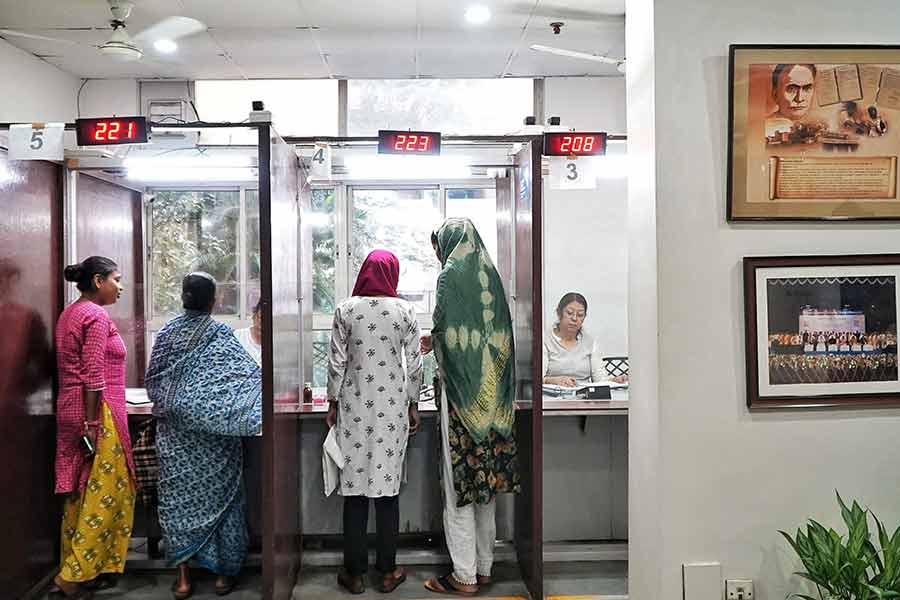
PBHRC receives as many as 1,200 patients a day, with the first floor being entirely devoted to free treatments, a brainchild of Prasanta Banerji Soumyajit Dey
Passing the baton
After graduating and obtaining her licence, Isha formally took over the reins of PBHRC in March 2023. Her focus was to bring a youthful zest to the setup by improving the working environment and the patient experience. “Earlier, patients would have to wait for 4-5 hours. Now, we’ve cut it down to two. We’ve also opened an online clinic with a fast courier service, which delivers all over India. This allows us to make our treatment accessible to even more people,” she smiles. By January, Isha plans to upgrade the online wing by offering one-day delivery.
Within two months of joining, Isha also opened a clinic in the Sunderbans. While on holiday there, a fisherman told her about how the region had no proper medical setup, and people were passing away from ailments that could be treated with early intervention, including childbirth. The clinic was set up last May, and runs thrice a week with a 24x7 dispensary. “Within no time, we started seeing 300 patients in a day. This clinic is a huge achievement for me, since both my father and grandfather had never expanded beyond Elgin Road.”
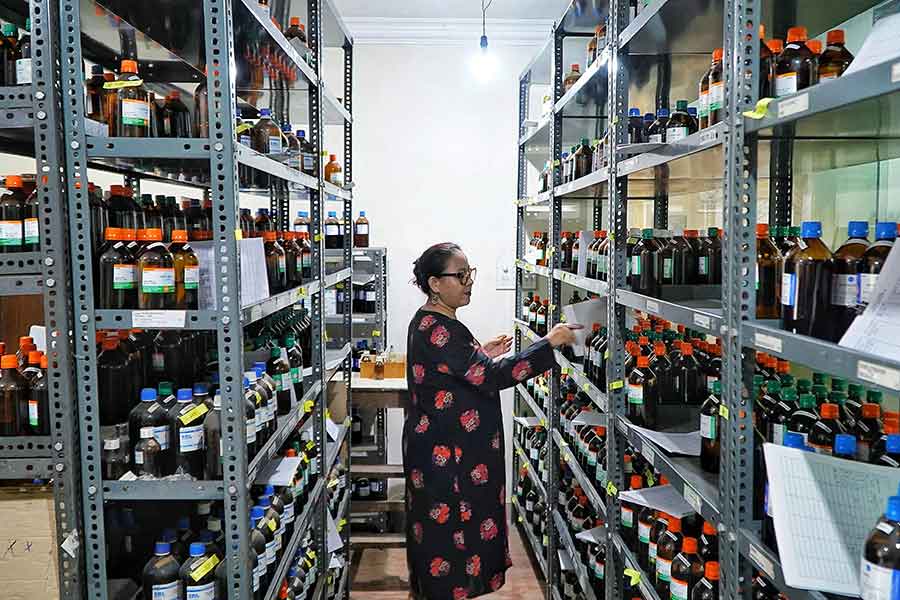
The clinic’s pharmacy Soumyajit Dey
Isha credits the standardised treatment within the Banerji Protocols for allowing her team to run two parallel clinics efficiently, and hopes that it will allow them to expand to even more regions around Bengal, and eventually India. “In this market of medical fear, we want to be a voice of trust for patients from the lowest economic rung. In fact, even when diagnostic labs come to us for commission, we request them to instead pass on the discount to our patients. It’s all about the love and blessings we get from them,” Isha signs off.
